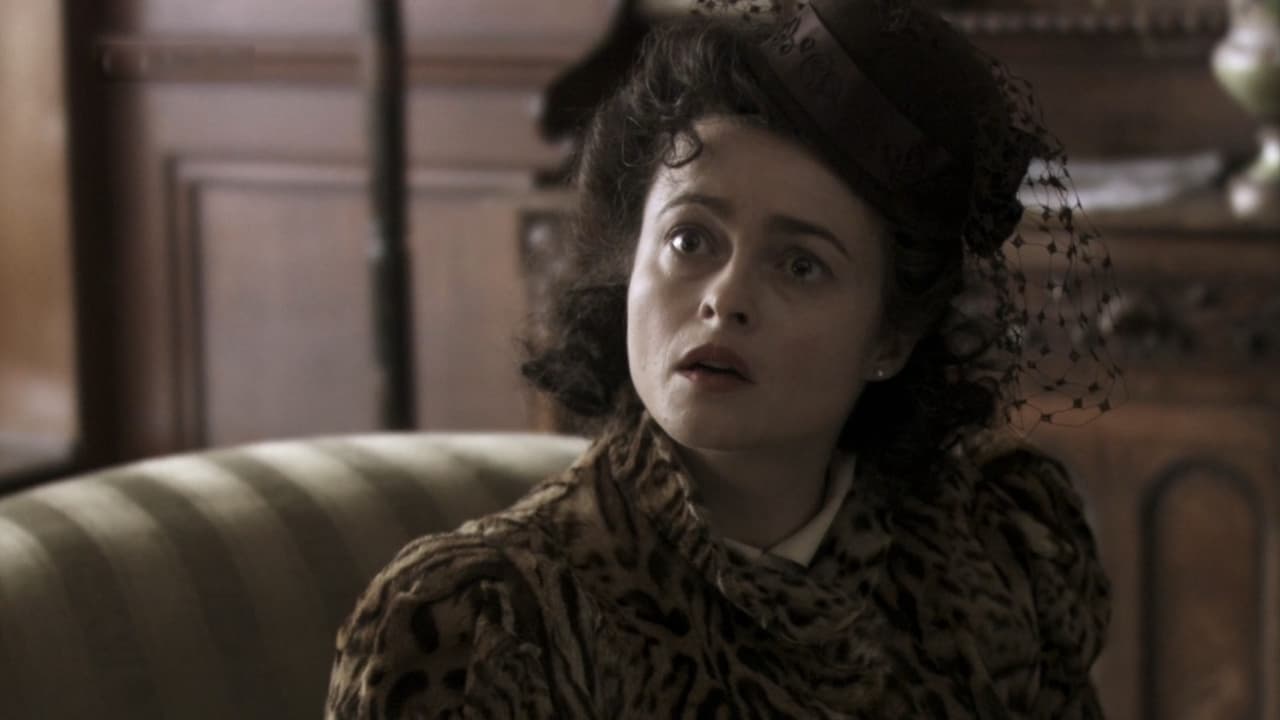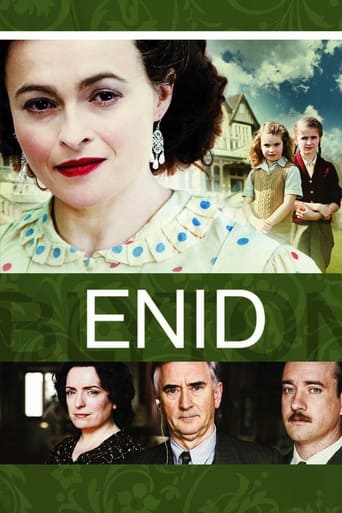

I wanted to like it more than I actually did... But much of the humor totally escaped me and I walked out only mildly impressed.
... View MoreA story that's too fascinating to pass by...
... View MoreMostly, the movie is committed to the value of a good time.
... View MoreThrough painfully honest and emotional moments, the movie becomes irresistibly relatable
... View MoreThis film promulgates the stories spread about that Enid Blyton was a horrible person and a cold mother. This is not factual. If you read Barbara Stoney's very accurate biography - "Enid Blyton, The Biography" with a foreword written by Miss Blyton's own daughter Gillian - you will see that she adored her children and loved both her first and second husbands. She contributed enormous amounts of teaching aids to the teachers and children of the twentieth century, and should be remembered with love and admiration. Do not take this cinematic telling of her life as factual. It isn't. In her daughter's own words - "I was very close to my mother, and talked with her freely from early childhood." which disputes the notion of her having been a cold mother. I have read her biography, and whilst this film captures the atmosphere of the time, it does not capture the true events.
... View MoreEnid Blyton is one of the best known children's authors to come from the UK, writing around 800 books during her career and created notable characters like Noddy and the Famous Five. When BBC Four made a season called Women we Loved they went for a warts and all telling of her live.Enid starts of with Enid Blyton (Alexandra Brain/Lisa Diveney/Helena Bonham Carter) in the middle of a broken home. She would tell stories to her brothers to reassure them when their parent argued. Her father leaves the family Enid blames her mother and when old enough leaves to London to be come a writer. After some initial rejection Enid meets the publisher Hugh Pollock (Matthew MacFayden) and the two quickly fall in love and marry. With Enid becoming successful their become wealthy, start to have a family. Yet their marriage soars and whilst Enid was very good with young fans was a terrible mother to her own children. With the looming Hugh's stress increases and Enid finds comfort with another man, Kenneth Walters (Dennis Lawson).Helena Bonham Carter is one of my favourite actresses and basically I would watch her in anything: even if a film is bad she is still very good in it. Her performance in Enid was very grounded and shows a very complex character, a woman who was brilliant children who were not own and had millions of fans, but awful with her own, often letting the nanny take care of them. Enid was made out to be a woman who would escape into fantasy and pretend nothing bad was happening, lying to save face. A woman who was too focused on her reading and had daddy issues for all her life. Bonham Carter was great at portraying this complex and rather vile character. But it was not just the Helena Bonham Carter show, Matthew MacFayden and Ramona Marquez were also great in Enid. Matthew MacFayden is an excellent actor and my favoured choice to follow Daniel Craig as 007. Here he has to play the archetypal 1930s man, some who had to bury his emotions and used alcohol to suppress them. But MacFayden was not just an emotional constipated, he does show a character who loves his children and who did love Enid once. Ramona Marquez is a great young child actress, best know for her role in Outnumbered. She still plays a naïve character, but this time much more scared and confused. She worked really well with the adult actors in the film.James Hawes is best known as a television director and with Enid he didn't have much he could do. He did try and bring in some flair with flashbacks and the occasional fantasy sequence, but for the most part he was making a period pieces. But he still does a fine job, working with limited settings and with a limited budget was able to make Enid very authentic. He also got excellent performances from his actors and shows he has some talent.Overall, worth watching, particularly if you are a Helena Bonham Carter fan.
... View MoreQuite by chance, British television recently showed on the same night biopics about two famous female children's authors of the early twentieth century, "Miss Potter" about Beatrix Potter and "Enid" about her younger contemporary Enid Blyton. I must admit that I never liked either of them when I was a child, although this had nothing to do with any prejudice against female writers; I continued to enjoy the works of E. Nesbit even after discovering that the "E" stood for "Edith", and I loved the historical novels of Rosemary Sutcliffe. Beatrix Potter's books, however, always struck me as twee and babyish, and as for Blyton I found her works dull and formulaic. (OK, I probably didn't use the word "formulaic" in those days, but when you had read one you had read them all. All 753 of them). I also disliked the preachy, moralistic strain in Blyton's works.In this film Blyton is played by Helena Bonham Carter, although there is no physical resemblance between them. All the photographs I have seen of Blyton show her as a severe-looking, unattractive woman, whereas Bonham Carter, in her early forties, is as lovely as she ever was. Helena, of course, was once Britain's reigning Queen of Period Drama, although she has now abdicated that particular crown in favour of Keira Knightley, with Carey Mulligan as heiress presumptive. "Enid" might appear to represent a return to the sort of role Helena was playing twenty years ago, but in fact the title character here is very different to the sweet young heroines she played in films like "Lady Jane" or "A Room with a View". As in the "Harry Potter" series, where she plays the evil Bellatrix Lestrange, she gets to play a villainess. The portrayal of Enid Blyton is this film is a remorselessly negative one. She is shown as snobbish and ruthlessly ambitious, caring for little except her own financial success. She is cold and unfeeling to her first husband, Hugh Pollock, to whom she is unfaithful. When during the war he leaves to take up an important command, she complains bitterly that he is putting his duty to his country before her. She poses as a lover of children, but neglects her own daughters Gillian and Imogen. She wants little to do with her mother and her two brothers. When she wants to marry her lover, a doctor named Kenneth Darrell Waters, she decides that she will divorce Hugh on the grounds of his (non-existent) adultery rather than allowing him to divorce her, and expects him to oblige her wishes. (There was a curious convention during the first half of the twentieth century that it was morally worse for a wife to cheat on her husband than vice versa; a woman who had been the guilty party in a divorce case would be forever branded as a harlot. Rather surprisingly, the English courts, which in other contexts held strictly to the maxim "the truth, the whole truth and nothing but the truth", were prepared to turn a blind eye to the vast amount of perjured evidence that was manufactured to uphold the legal fiction that no married woman was ever guilty of adultery). Indeed, the only thing that seems to upset Enid is the rumour that her books are ghost-written. (This was a persistent rumour during her lifetime, largely because people could not believe that one woman could be so prolific. Today, it seems to be generally accepted that she did indeed pen every book that bears her name). Bonham Carter is a very talented actress, and her performance here is a good one, but it never becomes a really great one. Indeed, the script never gives her the chance to give a great performance, because the portrait of Blyton is so negative and one-dimensional, never allowing her any good qualities except an immense capacity for hard work. There are also good contributions from Matthew Macfadyen and Denis Lawson as Blyton's two husbands. Hugh Pollock was nine years older then his wife, whereas Macfadyen is in fact eight years younger than Bonham Carter, so the make-up department also deserve credit for making him seem credibly middle-aged. Another weakness of the film is that the early scenes were very rushed. In the space of a few minutes Enid goes from an Edwardian schoolgirl to a married, middle-aged author with two children in the 1930s. One of the film's theories is that Blyton's emotional difficulties in later life were the result of her coming from a broken home after her father, whom she idolised, left her mother, so it is unfortunate that her early life was not examined in greater detail. I never met Enid Blyton- she died when I was a young child- so for all I know she might have been every bit as unpleasant as the character portrayed here. I just wondered why the film-makers bothered to make a biopic of someone they obviously regarded as a prize bitch. 6/10
... View MoreI began watching this quite by accident and became so absorbed in Helena Bonham Carters performance it was impossible to turn it off.Helena Bonham Carter completely absorbs the role of Enid to such an extent it seems that she has been taken over by her. Enid Blyton is portrayed as self absorbed, selfish and a terrible mother which is quite true in reality, although some scenes have been added purely for the narrative.After having two children she becomes more absorbed in the lives of the children who write to her and love her books. She needs the reassurance of being idolised by these children who know nothing about her more than she cares for her own daughters. Her husband Hugh is driven to drink and another woman by her complete self absorbed behaviour and blatant disregard for him now he has served his purpose and been the one to have published her books. She meets another man and begins an affair with him, a doctor called Kenneth Darrell Waters. She asks her first husband for a divorce, ignoring her own adultery and using the children as a bargaining tool. He agrees on the understanding he can see the children whenever he wants and Enid initially agrees. She slowly begins to cut him out of her children's lives by destroying letters he sends them and saying the children are out when he telephones. When her youngest challenges her Enid accuses her of lying and simply send her off to boarding school.This is a very good film, even for people who are not fans of Enid Blyton's, purely for Helena Bonham Carter's breathtaking performance. I would highly recommend this to people.
... View More